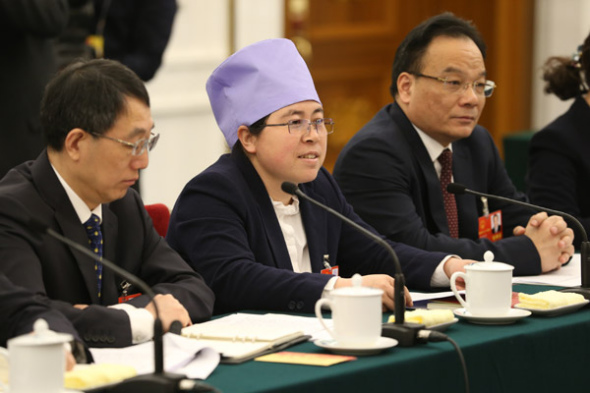
NPC deputy Ma Huijuan speaks at a group meeting during the two sessions in Beijing. (Photo by WU ZHIYI/CHINA DAILY)
For the past 17 years, Ma Huijuan's biggest pleasure has been immersing herself in reading. But borrowing books can be even harder than borrowing money in her home in the Ningxia Hui autonomous region.
Ma, 36, who is from the Hui ethnic group, started writing stories on her mobile phone and published her first book in 2016. This year, Ma was elected as a deputy to the National People's Congress.
The suggestion she brought to Beijing involved reading, while attending the two sessions.
"I suggested the government should increase efforts to build more libraries," she said. "Currently, all cities are required to build city libraries, and most villages have small libraries. But there is a gap in building and improving libraries in county-level areas.
"Many libraries in these areas are dilapidated, and the books, which are mostly about agricultural technology, have not been changed or updated for years. People living in counties want information about arts and culture to enrich their lives." Before 2000, Ma and her family lived in Xihaigu, an area known as "bitter barren land" in the southern part of Ningxia.
She was among many villagers who moved to Wuzhong-a city with more fertile land and a better climate-with the help of the local government. Her family settled in Hongsibao, a new district built for those relocating.
"From 2000 to 2010, I did not read any books as there weren't any. Because the whole district was newly developed, I suppose building a library was among the last things that rural people wanted," she said.
Desperate for something to read, all she could lay her hands on were old newspapers used to wrap food.
Ma acquired her first mobile phone in 2009 and started using it to record her thoughts.
Several months later, her sister helped her to use the phone to connect to the internet, which Ma described as the "first time she felt connected to the world outside Ningxia".
Ma has published one book and is working on her second, which is about relocation, while scores of her articles about rural life have been published in newspapers and magazines.
Online, Ma is known as "thumb writer", because all of her works were produced on her mobile phone. In the past 17 years, she has gone through 11 mobile phones simply because she types so much.
She said the rural revitalization strategy, proposed by the 19th National Congress of the Communist Party of China in October, has given her great hope for the enrichment of culture facilities and attitudes.
"For the past several decades, the livelihoods of rural people have improved greatly, but our cultural lives have not kept pace with other improvements," she said.
"Now is the right time to enrich rural people's cultural lives, which is also one of the key goals in the strategy."


















































